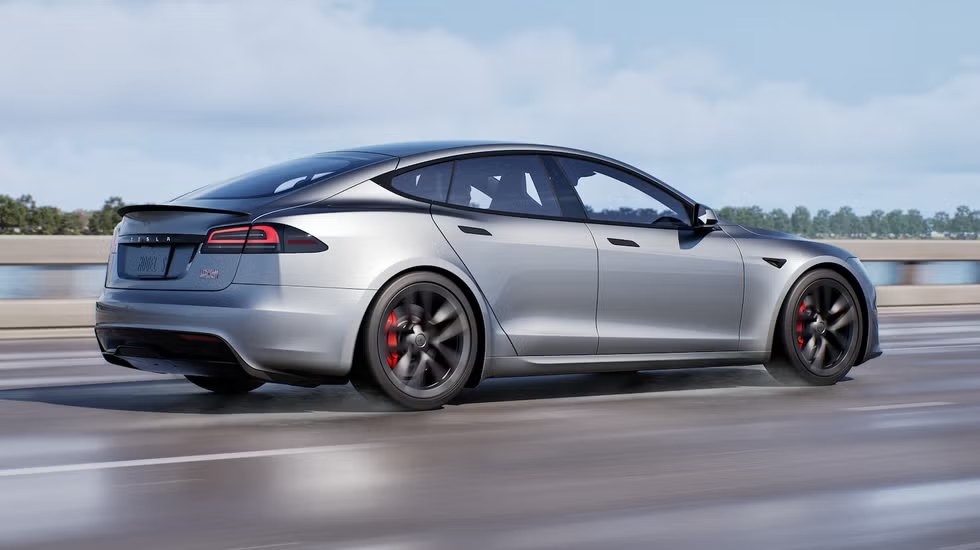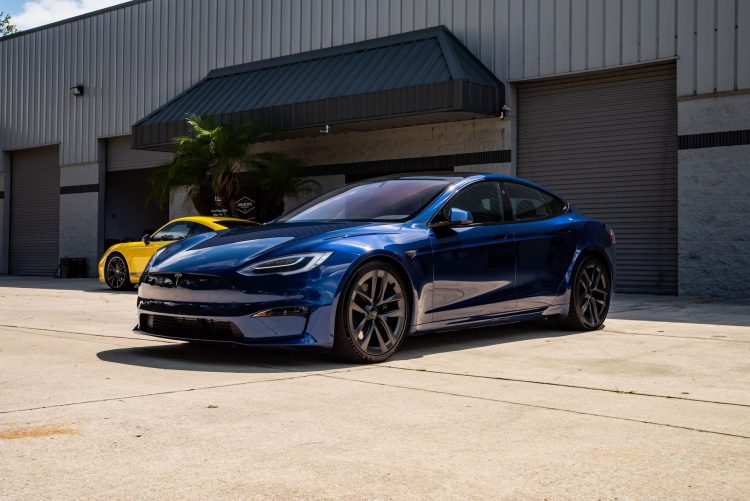Introduction
The automotive world has witnessed a dramatic shift in recent years, particularly with the rise of electric vehicles (EVs). Tesla, led by Elon Musk, has become a dominant player in the electric vehicle market, with its flagship sedan, the Model S, standing as a revolutionary force in the luxury car market. However, the Model S is not alone in the luxury sedan category; it competes against traditional gasoline-powered sedans from prestigious brands like BMW, Mercedes-Benz, and Audi, which have long been the standard bearers of luxury, performance, and comfort. The comparison between Tesla’s Model S and these traditional luxury sedans is both fascinating and complex, as it pits cutting-edge electric technology against decades of automotive refinement.
This article will compare the Tesla Model S to traditional luxury sedans, evaluating their performance, comfort, features, and long-term reliability. By examining these aspects, we will explore how the Model S stacks up against luxury sedans in a rapidly evolving automotive landscape.
Performance Comparison
Speed and Acceleration
When it comes to performance, speed and acceleration are often the first metrics that come to mind. Traditional luxury sedans like the BMW 7 Series, Mercedes-Benz S-Class, and Audi A8 are known for their smooth, powerful engines, providing exhilarating acceleration and top-end speed. However, the Tesla Model S, with its fully electric powertrain, has redefined performance expectations in the luxury sedan segment.
The Tesla Model S, particularly the Plaid variant, boasts a 0-60 mph acceleration time of under 2 seconds, making it one of the fastest production sedans on the planet. This is due to the instant torque provided by its electric motors, which deliver unparalleled acceleration. In comparison, traditional luxury sedans with high-performance engines, such as the BMW M760i or the Mercedes-AMG S63, take between 3.5 and 4 seconds to achieve the same acceleration. The instant torque provided by electric motors gives the Model S a clear edge in terms of raw speed and acceleration.
Traditional gasoline-powered luxury sedans typically rely on V8 or V12 engines that deliver impressive horsepower, but they are still bound by the limitations of internal combustion engines, including turbo lag and the need for gear shifting. Electric motors, on the other hand, offer seamless and continuous power delivery, resulting in smoother and quicker acceleration.
Handling and Driving Dynamics
While the Tesla Model S excels in straight-line speed, performance isn’t just about acceleration—it’s also about handling and driving dynamics. Traditional luxury sedans are renowned for their finely tuned suspensions, responsive steering, and well-balanced driving characteristics. Brands like BMW and Mercedes-Benz are known for offering a dynamic driving experience, where drivers can enjoy a blend of comfort and sportiness.
The Model S, although a heavy vehicle due to its large battery pack, surprises many with its handling. Tesla has equipped the Model S with an adaptive air suspension system that allows it to handle corners and sharp turns with confidence. The low center of gravity, thanks to the battery placement, contributes to improved stability and cornering performance. However, while the Model S is undoubtedly nimble for an electric vehicle, some driving enthusiasts might still prefer the nuanced steering feel and driving dynamics of a traditional luxury sedan, particularly from brands like BMW, which is known for its “Ultimate Driving Machine” ethos.
Comfort and Ride Quality
When it comes to comfort, traditional luxury sedans have a strong track record. The BMW 7 Series, Mercedes-Benz S-Class, and Audi A8 are designed to offer the utmost in refinement and ride quality. These vehicles come equipped with air suspension systems that can adjust ride stiffness to accommodate various road conditions, providing a smooth, almost effortless ride.
The Tesla Model S, on the other hand, uses air suspension as well, offering adjustable ride height to suit the road. The Model S does a remarkable job in terms of comfort, especially on highways, where its quiet cabin and smooth acceleration make for a serene driving experience. However, some critics note that the Model S’ ride quality, particularly on rougher roads, can sometimes be firmer compared to its traditional counterparts. Luxury sedans like the S-Class are designed to provide an ultra-soft and cushioned ride that makes passengers feel like they are gliding, while the Tesla’s firm suspension settings might not appeal to those who prioritize plush comfort above all else.
Technology and Features
One of the most distinguishing features of the Tesla Model S is its cutting-edge technology. The centerpiece of the Model S is its minimalist interior, dominated by a massive 17-inch touchscreen that controls nearly all of the car’s functions, from climate control to navigation and media. The system is highly intuitive, regularly updated via over-the-air software updates, which allows Tesla to continually improve its vehicles without requiring a visit to the dealership.
In contrast, traditional luxury sedans are also packed with state-of-the-art technology. The Mercedes-Benz S-Class, for example, boasts a high-tech MBUX infotainment system with augmented reality navigation, while the BMW 7 Series comes equipped with a touchscreen interface and a virtual assistant. However, these systems, while advanced, don’t quite match the seamless, futuristic experience offered by Tesla’s approach. Additionally, the S-Class and 7 Series also come with a more traditional, physical button-based interface, which can feel dated compared to the Tesla’s entirely digital experience.
Tesla’s Autopilot and Full Self-Driving (FSD) packages, which offer semi-autonomous driving capabilities, are another area where the Model S stands out. Tesla is widely recognized as a leader in autonomous driving technology, offering features like adaptive cruise control, automatic lane changing, and, in some cases, fully autonomous driving in certain conditions. Traditional luxury sedans have their own semi-autonomous driving features, but none are as advanced as Tesla’s Autopilot. For example, BMW’s Driving Assistant Plus system offers similar features but lacks the level of sophistication and future-forward vision that Tesla offers in terms of autonomous driving.

Long-Term Reliability
Tesla’s Long-Term Reliability
Long-term reliability is an area where traditional luxury sedans have historically excelled. Brands like Lexus and Mercedes-Benz have earned stellar reputations for building durable, long-lasting vehicles that retain their value over time. These manufacturers have decades of experience in building cars with reliability in mind, and their engineering teams have honed these skills over generations.
Tesla, on the other hand, is a relatively new player in the automotive industry. Although it has garnered a devoted following and built a reputation for innovation and performance, questions surrounding the long-term reliability of its vehicles persist. Tesla Model S owners have reported a variety of issues, ranging from battery degradation to electronic malfunctions, and while many of these issues have been addressed through software updates and repairs, concerns over the long-term durability of Tesla’s electric powertrain remain. The battery, which is the most crucial component of an electric vehicle, typically comes with an eight-year warranty, but concerns regarding its degradation over time, particularly in high-mileage vehicles, have raised some doubts.
Traditional luxury sedans, by comparison, are backed by long histories of engineering excellence. For example, vehicles like the Lexus LS or the Mercedes-Benz S-Class are well-known for their longevity and dependability. These vehicles often require fewer repairs and can easily last hundreds of thousands of miles when properly maintained. The combination of established reliability, solid build quality, and available service networks gives traditional luxury sedans an advantage in terms of long-term durability.
Maintenance Costs
One of the factors that may influence long-term reliability is the cost of maintenance. Traditional luxury sedans can be expensive to maintain, especially when considering the complexity of their internal combustion engines and the associated components such as turbos, transmissions, and exhaust systems. These vehicles often require specialized servicing, and replacement parts can be costly.
Tesla’s electric vehicles, including the Model S, generally have fewer moving parts than traditional vehicles, which means they require less maintenance overall. The absence of a traditional internal combustion engine reduces the number of components that can fail, and electric motors are known for their durability and long lifespan. However, the cost of servicing a Tesla, particularly when it comes to issues like battery replacement or electronics repairs, can still be relatively high compared to traditional sedans. Furthermore, Tesla’s service network is not as extensive as those of established luxury automakers, which could present challenges for owners in remote locations.
Conclusion
When comparing the Tesla Model S to traditional luxury sedans, it’s clear that both have their own unique strengths and weaknesses. The Model S excels in terms of performance, offering unparalleled acceleration and cutting-edge technology, especially in the realm of autonomous driving. However, while it offers a comfortable ride and an impressive array of tech features, it may not quite match the plushness and refinement of traditional luxury sedans like the Mercedes-Benz S-Class or BMW 7 Series, which have long been synonymous with luxury, comfort, and precision.
In terms of long-term reliability, traditional luxury sedans still have the upper hand, thanks to decades of engineering expertise and established reputations for durability. Tesla’s reliability has improved over the years, but the brand is still relatively young compared to the legacy of brands like Mercedes-Benz, BMW, and Audi.
Ultimately, the decision between the Tesla Model S and a traditional luxury sedan will come down to personal preference. For those who prioritize cutting-edge technology, performance, and sustainability, the Tesla Model S is a compelling choice. However, for those who value long-established luxury, refinement, and reliability, a traditional luxury sedan may still hold the upper hand.


































Discussion about this post